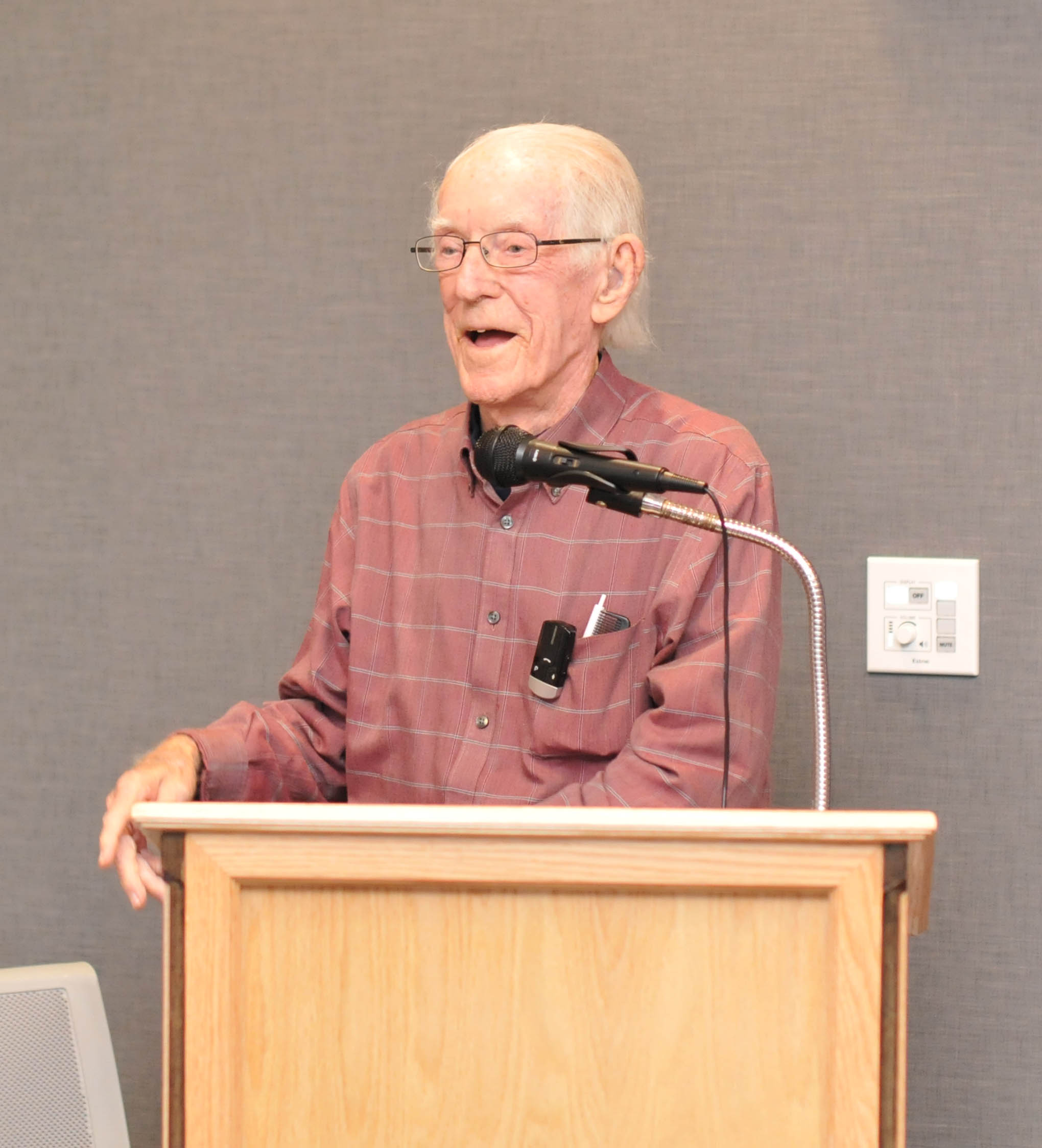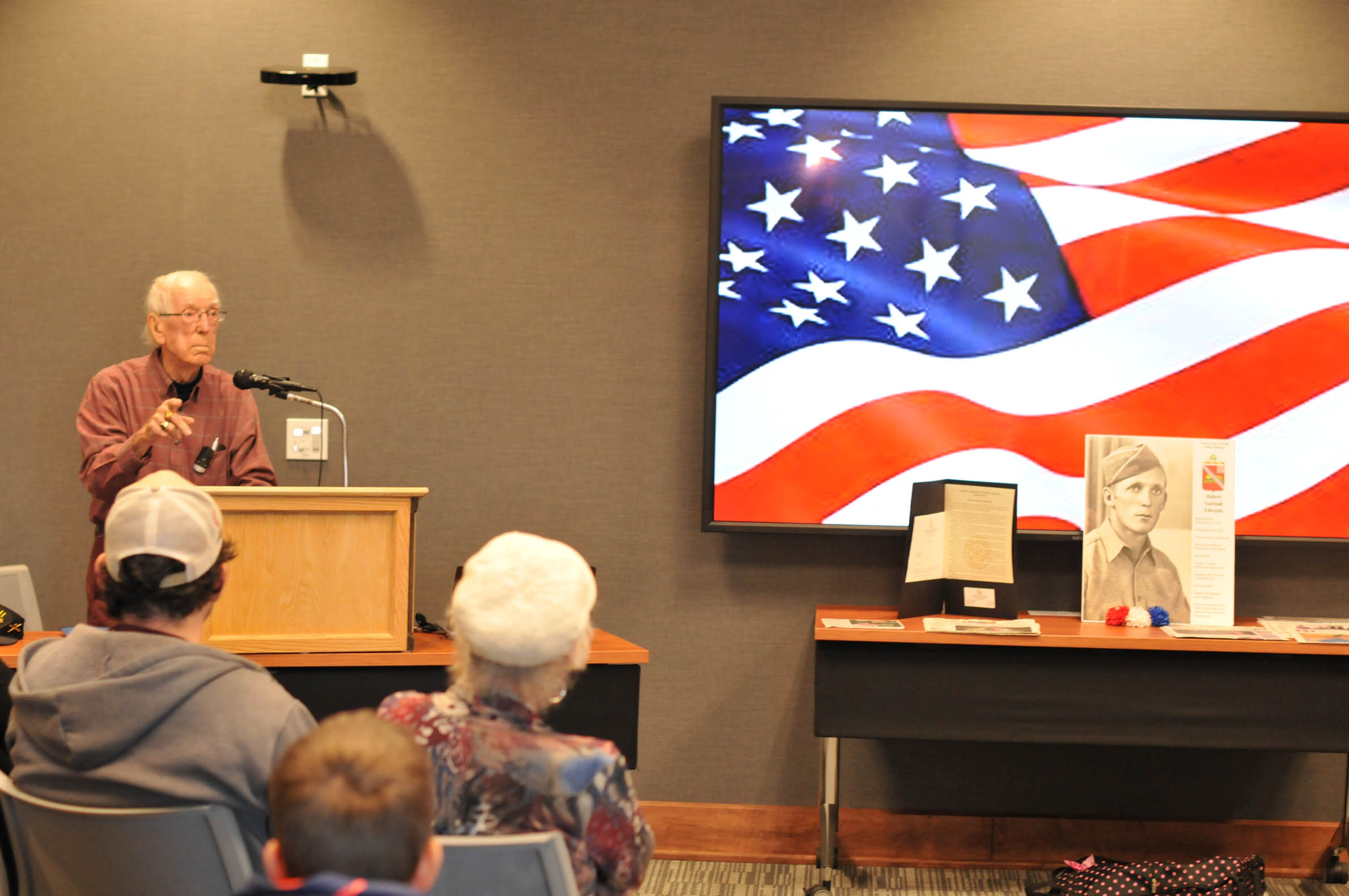College News
Hubert G. Edwards speaks of his WWII experiences at CCCC program
Notice: This article is older than 12 months. Names, contact information, programs, titles, etc. might have changed. If you have any problems please call the main college number, 1-800-682-8353, and we will be happy to direct you accordingly.

click image to enlarge ⊗
Hubert Garland Edwards recounted his remarkable journey through North Africa and Europe during World ... (more)

click image to enlarge ⊗
Hubert Garland Edwards shared his memories of World War II during a recent program at Central Carolina ... (more)
11.12.2019 • College & Community • College General • Special Events
SANFORD - "Let me ask you: How would you like to take a trip with me?"
After opening his recent lecture at Central Carolina Community College with that invitation, Hubert Garland Edwards did just what he offered, taking everyone back in time to the tumultuous year of 1942 and recounting his remarkable journey through North Africa and Europe during World War II -- a trip that included 660 days on the front lines and even a chance encounter with future president Gen. Dwight D. Eisenhower and legendary Gen. George S. Patton.
For nearly an hour, the 101-year-old Edwards stood behind a podium, placing his audience into situations he faced in battle, occasionally asking for their impressions and correcting some common misunderstandings about the Second World War. The CCCC Student Ambassadors sponsored the program.
"A Complete Annihilation"
One early stop landed everyone in Tunisia, February 1943, where Edwards and his 17th Field Artillery Battalion were involved in what would become known to history as the Battle of Kasserine Pass, the first major engagement in Africa. He described how his battalion united with forces invading Africa from other directions and moved toward a narrow mountain gap around which the battle raged. Enemy soldiers from Germany and Italy were ready.
"We were annihilated," Edwards recalled. "We lost 199 enlisted men. We lost 35 officers. We lost 12 guns, every piece of road equipment we had but one." But soldiers who somehow managed to survive found a place where they could regroup with new equipment and reinforcements. In several weeks, the tables turned. "We gave them what they gave us -- a complete annihilation. We absolutely destroyed them."
Not all of his stories were as gruesome. Edwards also recalled lighter moments with his fellow soldiers -- placing bets on how many days it would take for the Allies to conquer Sicily (he threw his money down on 32, but it took 44) and arriving in Rome only to find the Germans had evacuated. "We go in and take over," he said. "We took a two-week vacation to view ruins, do sightseeing."
Unexpected Guests
But the story that drew the most reaction from about 50 students and community members packed into a meeting room in the Dennis A. Wicker Civic and Conference Center was that brush with the generals.
While drinking coffee one day in France, Sgt. Edwards and his colleagues heard leaves rustle in the woods. In what must have been an almost surreal experience for the young soldier, out walked Gens. Eisenhower and Patton. The sergeant called his men to attention and asked if the generals had a few minutes to spare.
As Edwards recounted the discussion, it began with a debate on the quality of the coffee, but then shifted to the prospects for victory in Europe.
"I'm here to look around and see how things are doing, and what I see, I think we're going to win this war," Edwards remembers Eisenhower saying. "What do you think?"
"I don't think so, sir," Edwards replied to the Supreme Allied Commander in Europe, who seemed taken aback. "Sir, you say you think we're going to win this war and I disagree with you. I don't think we're going to win this war. I know we're going to win it."
The Final Destinations
The stories Edwards told focused on a military career in which the howitzer gunner received several medals and ribbons, including one Silver Star Medal for valor in combat and two Bronze Star medals for heroic or meritorious achievement or service.
But that was just the beginning of a life that has included other accomplishments. Edwards served on the first board of directors for Beaufort County Community College, located not far from the 300-acre tobacco farm where he was born, and worked at Hamilton Beach, where he retired as production manager. On a table just to his left was a small placard listing high points of his military career and a collection of newspaper feature articles about his life.
With victory secured in Europe, his trip back in time came to an end, but not before Edwards had one final place to go. He slowly looked around the room and then urged everyone to appreciate the many comforts and luxuries that people can take for granted. "Say thank you, Lord," he told everyone, "(that) I haven't got to sleep on the ground or in a foxhole tonight."
Categories
- Admin, Faculty & Staff Category
- Arts & Entertainment Category
- Clubs Category
- College & Community Category
- College General Category
- Continuing Education Category
- Curriculum Programs Category
- Distance Education Programs Category
- Facilities/Buildings Category
- Finances Category
- Foundation Category
- Graduations Category
- Lee Early College Category
- NCCCS Category
- SGA Category
- Special Events Category
- Sports Category
- Students/Graduates Category
- Uncategorized Category
Archives

